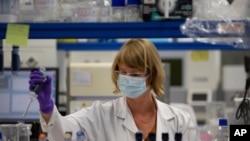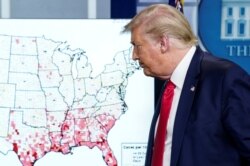U.S. pharmaceutical giant Johnson & Johnson has begun late-stage human trials of a single-dose COVID-19 vaccine in the United States.
Dr. Paul Stoffels, Johnson & Johnson’s chief scientific officer, told reporters Wednesday that 60,000 participants have begun receiving the vaccine across 215 locations in the United States, as well as internationally in Argentina, Brazil, Chile, Colombia, Mexico, Peru and South Africa. Dr. Stoffels said Johnson & Johnson moved into the late-stage trial after seeing positive results from its combined Phase 1 and 2 trials in the U.S. and Belgium.
The Johnson & Johnson vaccine is the fourth potential coronavirus vaccine undergoing large-scale Phase 3 testing in the United States, joining Moderna, AstraZeneca and a joint effort by Pfizer and German-based BioNTech. All four efforts are being developed under the Trump administration’s Operation Warp Speed coronavirus vaccine initiative, which aims to deliver 300 million doses of an approved vaccine by January 2021.
Because it can be administered by a single dose, Johnson & Johnson’s vaccine has significant advantages over the other three potential vaccines, which require two doses. The single-dose vaccine would not have to be kept frozen in ultracold temperatures, making it easier to utilize in a mass immunization campaign.
U.S. President Donald Trump hailed the announcement from Johnson & Johnson on Twitter Wednesday. “Big news. Numerous great companies are seeing fantastic results. @FDA must move quickly!,” he wrote, referring to the U.S. Food and Drug Administration, which would give final approval to any new vaccine.
President Trump told reporters at the White House Wednesday that he may reject a proposal by the FDA to implement a set of strict new guidelines for emergency authorization of a new COVID-19 vaccine, saying it sounded “like a political move.” The new rules, first reported Tuesday by The Washington Post, would require drug makers to observe participants in late-stage clinical trials for at least two months after they receive a second and final dose of an experimental vaccine.
If the new rules are adopted, an emergency authorization would come well after the November 3 presidential election, the date the president has constantly predicted such a vaccine would become available.
Trump’s threat to reject the proposed new guidelines from the FDA came hours after the agency’s head vowed that “science will guide our decisions” as the agency decides whether to give full or emergency authorization to a coronavirus vaccine.
Speaking to the Senate Committee on Health, Education, Labor and Pensions, Dr. Stephen Hahn said those decisions will be made by career FDA scientists following the agency’s “rigorous expectations for safety and effectiveness.”
The FDA and other federal scientific and regulatory agencies have seen their credibility diminished by constant administration efforts to revise their reports and guidelines to maintain Trump’s views about the nature of the pandemic.
The United States is leading the world in both the number of total COVID-19 cases with over 6.9 million, and fatalities, at almost 202,000. The United States and many other nations are experiencing a surge of new coronavirus cases, prompting many to reimpose a set of strict lockdowns first ordered at the outset of the pandemic.
Canadian Prime Minister Justin Trudeau said Wednesday in a televised address that the nation’s four largest provinces have entered a second wave of the COVID-19 pandemic.
“We’re on the brink of a Fall that could be much worse than the Spring,” Prime Minister Trudeau warned. Canada has seen an average of 1,123 new cases daily over the past week, compared with an average of 380 new cases a day in mid-August.
In Israel, Prime Minister Benjamin Netanyahu announced Thursday that the country is returning to a full lockdown effective Friday, and lasting for two weeks as its infection rate spirals out of control. Schools, entertainment venues and most businesses will be closed, while restaurants will be limited to delivering food. Residents will be required to stay within 500-1,000 meters of their homes, except for work and shopping for food and medicine, while outdoor gatherings will be strictly limited to 20 people.






